Sauntering down Taipei’s Zhenjiang Street (鎮江街), unsuspecting pedestrians are lured by a seductive scarlet carpet in front of what appears as a humble and rather mundane apartment — an abode that houses the only vegetarian restaurant in Taiwan on Michelin’s Bib Gourmand list: Serenity.
Aside from the restaurant’s pronounced store sign, its interior is almost entirely pigmentless, perhaps to highlight the vibrant colors of each exquisite dish. The anterior of the restaurant, enclosed in floor-to-ceiling glass panes, allows sunlight to be radiated onto every corner, creating a bright and invigorating atmosphere.
The interior decor consists of pale white walls, polished dark-brown wooden seats, and ordinary rectangular and round tables; though seemingly drab, such arrangement imbues a homey image that possibly leaves some reminiscing about their childhood.
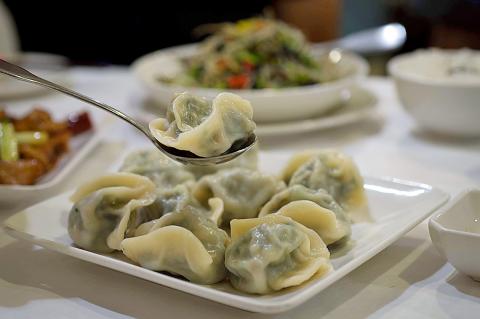
Photo: Vanessa Tsao
As our group of four waited to be seated, we couldn’t help but notice a spicy aroma coming from the kitchen. It turns out, this otherworldly scent was merely a byproduct of artwork jointly produced by two expert chefs, one specializing in Sichuan cuisine and the other in vegetarian cooking. With innovative mindsets, the two aim to intermix vegetarian ingredients with traditionally meat-based Sichuan flavors.
The waitress, who momentarily greeted us as we sat down, proudly introduced signature dishes on their 100-item long, full-vegetarian menu. Their menu, however extensive, was unfit for our indecisive minds; we ended up adhering to the waitress’s suggestions and ordered five dishes plus four bowls of rice.
The first to arrive was house-made vegetarian dumplings (NT$160). The dumplings are composed of a blend of finely shredded pickled cabbage, translucent vermicelli and diced mushrooms wrapped in a thin sheet of flour dough. The restaurant’s generous use of fresh, quality ingredients is evident in every bite; dipping in mild soy sauce adds an extra hint of savoriness. A Taiwanese staple, these boiled dumplings were the perfect preamble to the hearty dishes that follow.
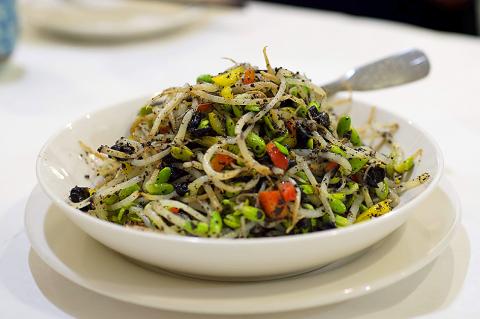
Photo: Vanessa Tsao
Then came the black bean sprouts in truffle sauce (NT$300), sauteed vermicelli with spicy vegetarian minced meat (NT$220) and vegetarian kungpao chicken (NT$220).
The bean sprouts feature assorted greens: crunchy young green sprouts, black beans, roughly diced yellow and red bell peppers tossed in an earthy truffle pate. To our surprise, the distinct flavors of constituent ingredients were not overshadowed by the truffle, which is usually indicative of the chef’s technique and precision.
The vermicelli, commonly known as “Ants climbing up a tree” (螞蟻上樹), is sauteed with bits of shiitake mushrooms, celery, chili peppers, soy-based minced pork in a piquant Sichuan spice blend and topped with aromatic coriander. The fiery vermicelli danced on our tongues. It sure was a tad spicy — though we had been warned. For those not used to firey Sichuan food, a reduction of spice is recommended.
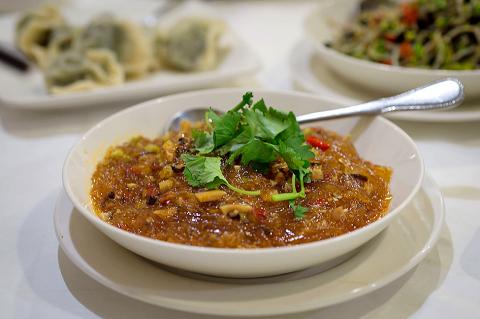
Photo: Vanessa Tsao
Of the three, the dish that really stood out for me was the soy and wheat infused kungpao “chicken.” Stir-fried with hollow Chinese chili, firm spring onions, peanuts and veiled by a tangy fragrant chili sauce, everything on that dish glistened. Juices in the chicken bursted with every bite. Needless to say, white rice harmonized with these Sichuan flavors.
The finale to such a scrumptious vegetarian meal was the impressive squid balls. The mixture of soy, wheat and what seems to have the texture of seitan or tofu is stuffed in cremini mushroom and deep fried to golden-brown perfection. They are seasoned with a dash of pepper salt and lie atop a bed of crispy basil leaves. These plant-based squid balls tasted so similar to actual squid balls that I forgot they were completely vegetarian.
We probably should have ordered their much-lauded steamed stinky tofu. I’ll definitely come back, though. The price was unbelievably fair (four overfull stomachs costed NT$1,408); no wonder this restaurant was featured on the Michelin guide’s Bib Gourmand section.
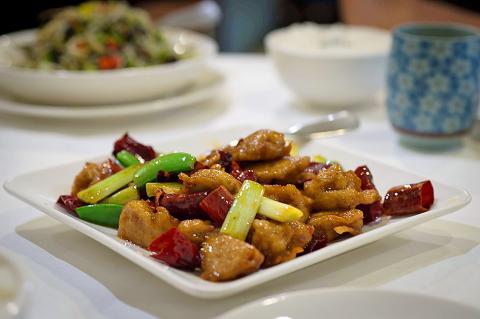
Photo: Vanessa Tsao
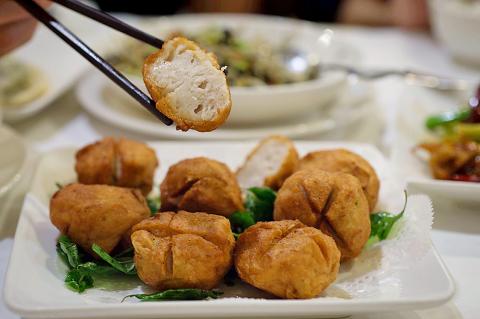
Photo: Vanessa Tsao

The Taipei Times last week reported that the rising share of seniors in the population is reshaping the nation’s housing markets. According to data from the Ministry of the Interior, about 850,000 residences were occupied by elderly people in the first quarter, including 655,000 that housed only one resident. H&B Realty chief researcher Jessica Hsu (徐佳馨), quoted in the article, said that there is rising demand for elderly-friendly housing, including units with elevators, barrier-free layouts and proximity to healthcare services. Hsu and others cited in the article highlighted the changing family residential dynamics, as children no longer live with parents,

It is jarring how differently Taiwan’s politics is portrayed in the international press compared to the local Chinese-language press. Viewed from abroad, Taiwan is seen as a geopolitical hotspot, or “The Most Dangerous Place on Earth,” as the Economist once blazoned across their cover. Meanwhile, tasked with facing down those existential threats, Taiwan’s leaders are dying their hair pink. These include former president Tsai Ing-wen (蔡英文), Vice President Hsiao Bi-khim (蕭美琴) and Kaohsiung Mayor Chen Chi-mai (陳其邁), among others. They are demonstrating what big fans they are of South Korean K-pop sensations Blackpink ahead of their concerts this weekend in Kaohsiung.

Taiwan is one of the world’s greatest per-capita consumers of seafood. Whereas the average human is thought to eat around 20kg of seafood per year, each Taiwanese gets through 27kg to 35kg of ocean delicacies annually, depending on which source you find most credible. Given the ubiquity of dishes like oyster omelet (蚵仔煎) and milkfish soup (虱目魚湯), the higher estimate may well be correct. By global standards, let alone local consumption patterns, I’m not much of a seafood fan. It’s not just a matter of taste, although that’s part of it. What I’ve read about the environmental impact of the

Oct 20 to Oct 26 After a day of fighting, the Japanese Army’s Second Division was resting when a curious delegation of two Scotsmen and 19 Taiwanese approached their camp. It was Oct. 20, 1895, and the troops had reached Taiye Village (太爺庄) in today’s Hunei District (湖內), Kaohsiung, just 10km away from their final target of Tainan. Led by Presbyterian missionaries Thomas Barclay and Duncan Ferguson, the group informed the Japanese that resistance leader Liu Yung-fu (劉永福) had fled to China the previous night, leaving his Black Flag Army fighters behind and the city in chaos. On behalf of the